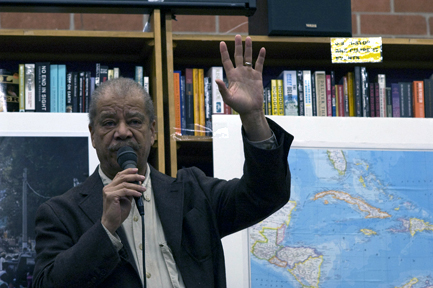Eyewitness recounts Haiti disaster
By Greg Zeman and
Chloe Ashcraft
The Guardsman

Civil rights attorney and Haitian democracy activist Walter Riley spoke at Revolution Books in Berkeley Jan. 22 about his experience in Haiti during and after the earthquake that devastated Port-au-Prince.
Riley was visiting family in Haiti when the earthquake occurred. “I was inside the house of a friend and at dinnertime the house started to shake. Being from California, I understood that this was probably an earthquake,” Riley said.
Within minutes there were hundreds of thousands of people in the street. “We saw people in the street with blood on them and there were blood and bones, crushed heads and terrible scars and deep wounds,” Riley said. “What I saw in the streets was just a horror I do not want to witness again, and television cameras cannot do it justice. To be up close and see someone in the flesh — as close as we are here — and to see terrible kinds of wounds are things you don’t forget and are hard to live with when you are part of humanity and have love for humanity.”
He was also in Haiti as the chair of the Haiti Emergency Relief Fund, an organization that supports people who are building schools and community clinics. It was formed after a 1991 military coup which removed Haiti’s first democratically elected president, Jean-Bertrand Aristide.
Hospitals and emergency relief programs started under Aristide were dismantled by reactionary forces after the coup. Riley views much of the suffering being experienced by the Haitian people as a direct result of Aristide’s removal from office.
“When this earthquake occurred, the government was not prepared to respond and the government did not respond,” Riley said, adding that he hoped some oversight could be created to make sure aid actually reaches organizations and people on the ground.
“They claimed that he was corrupt, but all Aristide ever asked for was dignified poverty,” he said. “A lot of money has gone to Haiti since the coup.”
Most of that money was misappropriated by a corrupt, reactionary government, according to Riley. He noted several large and well-kept police stations rising above a destitute nation.
Rumors of chaos in Haiti were exaggerated, according to Riley. He witnessed no crime following the disaster.
“I did look at some of the places that had ‘pharmacy’ written on them and tried to see if I could get inside,” he said. “Had there been some way to get those bandages and whatever else those pharmacists had, we had a right to them.” This remark elicited applause from the audience, leading Riley to add, “And that wouldn’t be looting.”
He recalled one young woman he saw pulled from a collapsed school building. “She had a school uniform on and she had just been pulled out of the rubble … She was in pain and shock and screaming,” Riley said.
He also recounted acts of mass cooperation in Haiti. “On the day of the earthquake, I saw people trying to help each other, and they developed some attempts at first aid and then brought people in and did what they could with alcohol and peroxide,” he said.
The response of the United States to Haiti’s crisis has been slow and inadequate, according to Riley.
“Haiti is an hour and a half by commercial flight from Miami to Port-au-Prince,” the activist said. “We have the ability to move almost instantly carry out military actions in any part of the world, but there was no mobilization in Haiti following the disaster.”
Riley said that the U.S. is not alone in its apathetic response — the United Nations have troops in Haiti. But, according to Riley, they aren’t doing much to help.
“We heard screams when the aftershock came and I saw places tumbling down and thousands of people screaming for help, who were already trapped and suddenly being covered with debris,” he said. “I asked a young man, ‘Have you seen any U.N. forces?’ He said ‘No.’”
Riley saw a U.N. truck with an armed escort, but wasn’t sure what it was carrying. “What we do know is that it didn’t stop to pick up the dead or to carry the wounded to the hospital or to hand out anything,” he said. “Nor did it make any announcement about where to go for help.”
Riley believes that, despite the tragedy, the aftermath of the disaster presents an opportunity for Haiti to rebuild and purge itself of political corruption.
“What this disaster has done is allowed us to tell the story of Haiti and the fight that the people in Haiti have right now for democracy. Every Haitian I have ever met knows the history of their fight for democracy as the first and only successful slave revolution,” he said. “We have tried to expose some of that corruption and what’s good now is we have a chance to talk to folks and a chance to have more people listen to us when we talk.”
Riley said the fight in Haiti is a practical one. “It’s just a fight for democracy. It’s not a fight for some fantastical, egalitarian government or society,” he said. “We have no claims for Utopia, just a desire for the masses of people to participate in their government and be free and able to build. To be able to say they are entitled to some dignity, even if they are poor and black.”
Riley ended by saying, “Haiti must be rebuilt by Haitian hands.”

Comments are closed.